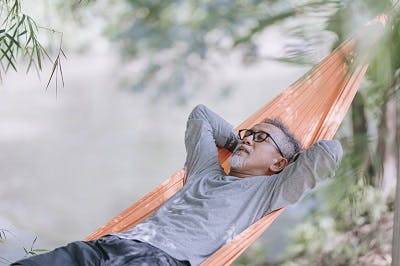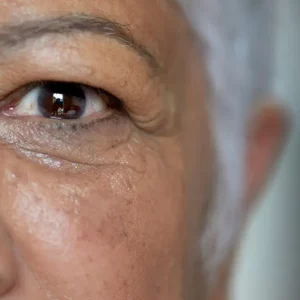Excessive sleeping after head injury can raise concern for both the survivor and their loved ones, however, sleeping allows the body to rest and the brain to heal. It also helps the brain conserve more energy, which is essential during TBI recovery.
When excessive sleeping after head injury persists, it may be diagnosed as post traumatic hypersomnia, which can include daytime fatigue and sleeping more than the usual recommended 8 hours at night.
This article will discuss some of the causes and contributing factors of post traumatic hypersomnia, while also exploring the benefits of sleeping a lot after a head injury, and when it’s appropriate.
- Is it normal to sleep a lot after a head injury?
- Is there such a thing as too much sleep after a head injury?
- Symptoms of post traumatic hypersomnia
- Causes and contributing factors of excessive sleeping after head injury
- Addressing contributing factors and coping methods for post traumatic hypersomnia
- When are stimulants appropriate for TBI survivors?
Is it Normal to Sleep A Lot After a Head Injury?
Sleeping allows the brain to heal and repair itself, which is crucial during TBI recovery – but this begs the question, is it normal to sleep a lot after a head injury? The answer is yes! It’s absolutely normal for survivors to sleep a lot after a head injury.
The brain typically uses about 20% of your total energy, and this percentage only increases as the brain attempts to heal itself after sustaining an injury. Therefore getting sufficient rest is completely normal and important in order for the brain to regain energy and heal itself.
There are many other benefits of getting adequate sleep after TBI, too. For instance, studies state that quality sleep helps with learning and remembering how to perform physical tasks, which many survivors strive for during TBI rehabilitation. Sleep also helps boost alertness and strengthen cognitive functions, especially working memory and attention, which survivors may struggle with after head injury.
Is There Such a Thing as Too Much Sleep After a Head Injury?

As you can see, sleep provides many essential benefits for TBI survivors. But perhaps now you may be wondering, how much sleep is too much sleep after a head injury?
Generally speaking, TBI survivors should listen to their bodies and sleep when they want, and as much as they can, because a healing brain requires rest. However, if too much daytime sleeping (or napping) interferes with nighttime sleep, then survivors may benefit from limiting the duration of their naps. For example, it can help to set an alarm to wake you up after a 30 minute daytime nap to ensure that it will not interfere with your sleep later that night.
Again, only survivors that struggle with nighttime sleep need to regulate their naps. If you find yourself taking long naps while also sleeping well throughout the night, that is perfectly normal and healthy. You are providing your brain with the rest it needs to heal itself.
Symptoms of Post Traumatic Hypersomnia
Sleeping has many benefits, but excessive sleeping after head injury may indicate post traumatic hypersomnia.
If you’re concerned about excessive sleeping it helps to look at the quality of your sleep and other potential symptoms, such as daytime fatigue. This can mean that even if you rested and slept a lot throughout the night, you might still wake up feeling tired or exhausted.
Other signs of post traumatic hypersomnia include:
- Irritability
- Anxiety
- Decreased appetite
- Slowed or delayed speech
- Memory difficulties
- Sleeping 10+ hours a night
- Restlessness
Post traumatic hypersomnia can often be confused with narcolepsy, which is another sleep disorder that also causes excessive sleep or drowsiness. A key difference between the two is in the way an individual falls asleep.
Individuals with narcolepsy can fall asleep almost anywhere if their bodies cannot resist it, even in the midst of a conversation. Whereas individuals with post traumatic hypersomnia don’t tend to fall asleep anywhere as instantly, they may feel exhausted but can usually force themselves to stay awake if necessary.
It can help to keep track of your symptoms and consult with your doctor to obtain a proper diagnosis.
Causes and Contributing Factors of Excessive Sleeping After Head Injury

Some of the most common effects of a traumatic brain injury include motor difficulties such as hemiparesis, or weakness on one side of the body. When the brain cannot communicate with the affected muscles as efficiently as it did before the injury, normal daily activities take more energy to complete.
For example, some survivors may find themselves taking longer to get up, brush their teeth, and get dressed. These activities can take up enough energy that they desire a nap right after, and this is perfectly normal.
Increased energy expenditure of normal daily activities is one of the most common causes of excessive sleepiness after brain injury. However, there are other factors that must be considered, such as the location of the injury and other secondary effects.
When sustaining an injury to the areas of the brain involved with sleep and wakefulness, such as the brainstem and hypothalamus, sleeping disorders can occur. For example, within the hypothalamus there is a neuropeptide associated with the sleep-wake cycle regulation known as hypocretin-1.
Studies have shown that hypocretin-1 levels are significantly lower in TBI survivors with mild to severe trauma, which can contribute to post traumatic hypersomnia.
Addressing Contributing Factors and Coping Methods for Post Traumatic Hypersomnia
While excessive sleepiness can be a normal part of the recovery process, sometimes there are contributing factors at play that need to be addressed. These include depression and hypothyroidism, among other potential conditions your doctor will screen you for.
Depression
Depression is a common secondary effect of TBI, and symptoms may include excessive drowsiness or sleeping a lot. When survivors show signs of post traumatic hypersomnia, doctors may check to see if depression is the underlying cause; and if so, may prescribe antidepressants or recommend psychotherapy.
Hypothyroidism
When there are endocrine imbalances in the body, such as hypothyroidism, it can impact the quality of your sleep. Symptoms of hypothyroidism include extreme fatigue, cold sensitivity, unexplained weight gain or loss, and hypersomnia.
To determine if thyroid or endocrine dysfunction is an underlying cause of post traumatic hypersomnia, your doctor may perform a blood test to measure the level of thyroid hormones in your bloodstream.
Sleep Apnea
Sleep apnea is a condition that causes an individual to repeatedly stop and start breathing, which can interfere with a regular night’s sleep. This sleeping disorder can occur for various reasons, including damage to the brainstem or insufficient oxygen. Survivors with sleep apnea may experience headaches in the morning, fatigue, or mood swings.
Fortunately, sleep apnea can be treated using a C-PAP machine, which is an oxygen mask you wear over your nose and/or mouth while you sleep. The goal is to supply the brain with more oxygen during your sleep cycle and wake up feeling less fatigued and more refreshed.
When Are Stimulants Appropriate for TBI Survivors?

Stimulants help increase frontal lobe activity in individuals who struggle with self-control and regulation, a characteristic of disinhibition after TBI. Stimulants can also help manage short attention span, impulsive behavior, fatigue, and the effects of other sleep disturbances.
If you struggle with excessive sleepiness after head injury, it can be tempting to reach for stimulants to help keep you awake. However, these should be used with caution because they can create health risks when not taken in moderation.
For instance, natural stimulants, like coffee or caffeinated tea, can help you stay awake and alert throughout the day but it’s important not to abuse caffeine intake after brain injury. Caffeine is a stimulant that can interfere with your body’s natural signals asking for much-needed rest.
Your doctor may also suggest avoiding alcohol and following a nutritious diet during TBI recovery to help maintain energy. Additionally, you can talk to your doctor to see if prescribed stimulants are appropriate for you.
Some of the most commonly prescribed stimulants for post traumatic hypersomnia consist of Modafinil and Amphetamines. Ritalin is especially popular for helping improve cognitive fatigue but be sure to consult with your doctor before taking any new medication.
Understanding the Correlation Between Head Injury and Sleeping A Lot
While excessive sleeping after head injury may seem concerning, it’s perfectly normal and beneficial during TBI recovery. Survivors experiencing post traumatic hypersomnia may feel fatigued, drowsy, low energy, and more. It’s important to listen to your body and rest whenever possible.
Excessive sleeping could also indicate other medical conditions, such as depression or sleep apnea. Therefore it’s important to talk to your doctor if you are concerned. (S)he can check for these conditions and prescribe the necessary treatment, like stimulants, to help cope with the symptoms and regain energy.
Nonetheless, it’s important to remember sleeping a lot after a brain injury is common and necessary to allow the brain to heal and help you recover more swiftly. As long as it’s not interfering with nighttime sleep, survivors should rest whenever the body asks for it.










